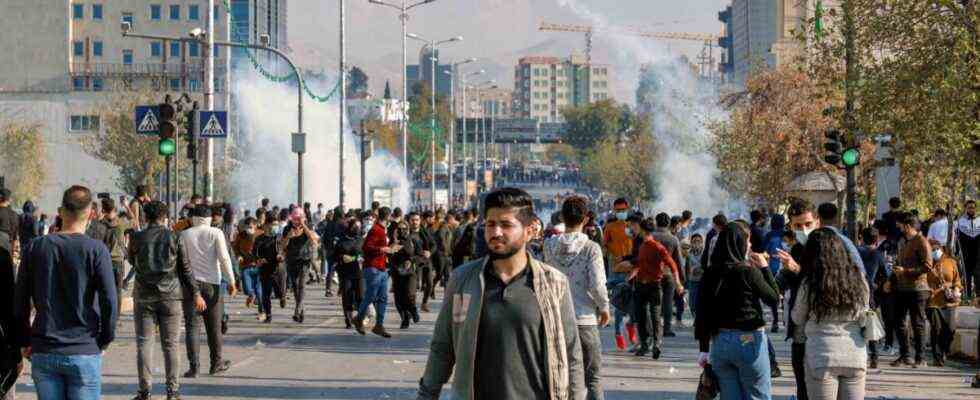On Saturday the Prime Minister seemed to give in. Masrour Barzani attended Salahaddin University in Erbil and sat in a group of chairs with students from different parts of the Kurdistan Autonomous Region to hear their complaints. “I know you have problems. But to solve them we have to listen to each other and feel responsible for them on both sides,” he said.
The conciliatory tones of the head of government did not seem to fit the actions of the security organs in the past week. Domestic intelligence officials Asayish, Peshmerga fighters and police officers used water cannons, tear gas, rubber-coated bullets and sticks against student protests. Since Sunday, starting from the regional metropolis of Sulaimaniya in the east, thousands of young Kurds took to the streets in many cities, initially peacefully, later the demonstrators threw stones and set fire to several government buildings. According to the demonstrators, there were more than 500 arrests in Sulaimaniya alone.
The trigger for the protests was the demand for student grants to be paid out that had been suspended seven years ago. Until 2014, the Kurdish Regional Government (KRR) had transferred 60,000 to 100,000 Iraqi dinars (around 40 to 70 dollars) per month. The payments had been canceled with reference to necessary savings due to the fight against the Islamic State (IS) and the low oil price.
“Many students come from poor rural regions, they need the money to be able to go home and not to be too much of a financial burden on their families,” reports a 33-year-old English professor from the University of Sulaimaniya. He wants to remain anonymous because he fears for his position and his freedom. At the beginning of the week, he says, four students announced that they would not be able to continue studying without the government’s money. This is how the protests started.
The conditions at his university are not tenable, explains the lecturer
But soon it was about more. The demonstrators complained that the state universities are being systematically disadvantaged – also in order to drive students and money into the private universities, which run the country’s ruling families. The conditions at his university are unsustainable, explains the lecturer: “I have study groups of up to 37 people. There are just four cleaning staff for every 2,000 students.” A 21-year-old student from the same university also reported corruption: “Those who do not have the necessary grades as an entry requirement for a subject can pay higher fees instead.”
The complaints of the students coincide with those of other people in the area. Most describe a society in which it is hardly possible to build an existence worth living without connections to the powerful or personal prosperity. The social researcher Mera Jasm Bakr is currently investigating the reasons for young Kurds to leave their homeland for the Konrad Adenauer Foundation. Thousands of people have left for Belarus in the past few months to travel to the EU or further from there. “Many of them are college graduates who can’t find jobs or at most $ 200 a month if they’re lucky,” Bakr said. The oil price has risen again. So the government would have money for reforms and aid.
Young Kurds are outraged by a society in which personal advancement depends almost entirely on relationships with the two ruling parties, the Democratic Party of Kurdistan (DPK) and the Patriotic Union of Kurdistan (PUK). Behind this duopoly are the clans of the Barzanis and the Talabanis, who divided up the region with its five million inhabitants.
Government employees cost 80 percent of the state budget
Dastan Jasim is researching the situation in Kurdistan at the Hamburg Giga Institute for Middle East Studies. Previous protests in 2011, 2018 and 2020 showed that the structural problems had never been resolved. The demographics – 60 percent of the population are under 30 years old – aggravate the situation. Jasim says of clientelism: “If you don’t belong to either party, you’re out on many levels.”
All the more so because the private sector is underdeveloped and the public sector is inflated. Government employees cost 80 percent of the state budget, Prime Minister Barzani also had to admit on Saturday. Salary savings, as most recently in the wake of the corona pandemic, are threatening the very existence of large parts of society. “Because of this and because of failed protests, the urge to flee has intensified,” said Jasim. Human Rights Watch and other groups also criticize the creeping process of undermining democratic structures and intimidating the opposition.
Desperation is forcing more and more Kurds not only into Belarus, but also into the rubber boats that are supposed to bring them from France across the English Channel to Great Britain. 27 people died in the wreck of such a boat last Wednesday, many of the victims came from Kurdistan. “I would be grateful if the British or the French could bring his body home,” the brother of a young man said afterwards Guardian. He did not ask anything from the Kurdish authorities: “They are the reason he left.”

